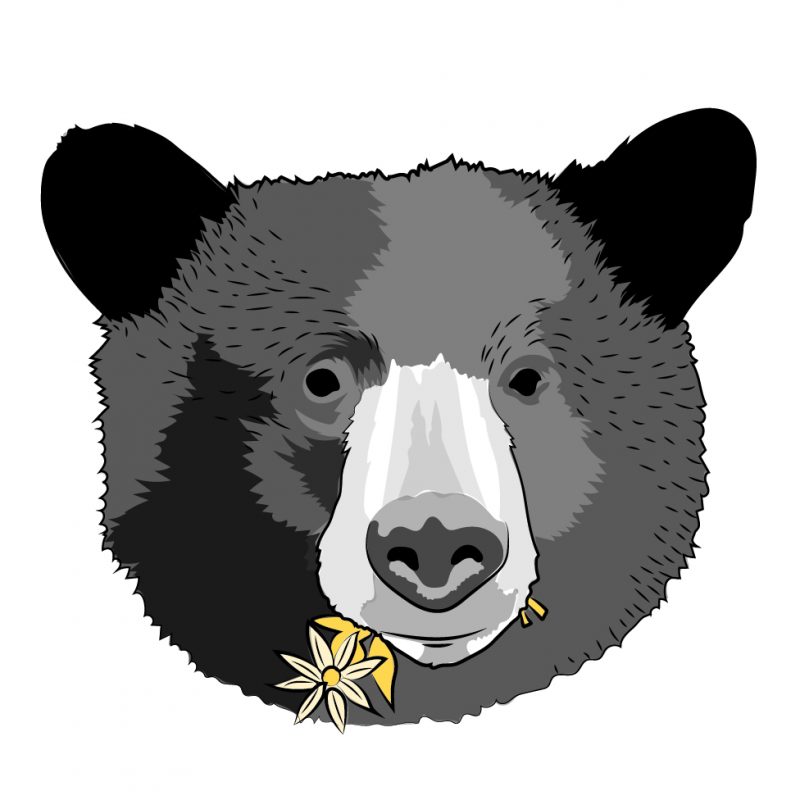“Rare predatory black bear” is the phrase July and I repeated most often to one another, laughing, during our nine-hundred-mile bike tour across Alaska and Canada. It had come from the mouth of an Alaskan park ranger. Our route would take us on the Cassiar Highway, one of the least populated roads in British Columbia, where we would certainly meet a bear or two.
“Do not,” the ranger told us, “try to outrun a bear. They might confuse you for prey. If you see one, stop and get off your bikes. Then, you have to talk to it. Talk to it until it understands you’re not a threat, or prey. Keep talking until it loses interest.”
“What do you say to a bear?” asked July.
“Anything,” said the ranger. “You’ll be fine, unless you run into the rare predatory black bear. In which case, you might be screwed.”
We began our trip that day. We had no choice but to walk our bikes, each loaded with fifty pounds of gear and food, about twenty miles up the mountain toward the White Mountain Pass. That evening, exhausted and swarmed by mammoth insects, we made camp just over the Yukon border, the sun still shining at midnight.
I was thirty-one, waist-deep in the quicksand of mental illness from which I would emerge years later to discover I had become middle-aged. I hadn’t gone on the trip because I thought it might cure me, but because I knew I would never go if I didn’t go then. I had missed certain things—trainhopping, for instance—while embracing others (voluntary homelessness, hitchhiking all over the country), and I knew that some windows disappear, not with age but with a closing of the mind. Accustomed to having booze with my morning tea, I was as shocked, that first day, at not having had a drink as I was by the mountain, the fatigue, and the creeping suspicion that we were in over our heads. We’d been city bike commuters for over a decade, but this was our first tour.
We woke the next morning sore, still tired, and with an acknowledgement of the potential absurdity of our situation. “Rare predatory bear,” July said, after I spilled piss down the front of my biking shorts. He had bought pStyles for the trip, and I would soak my shorts with pee for another week before I became fully used to pissing through a funnel. Using the device was a safety precaution—I didn’t want to know what would happen if I were caught with my pants down. July and I are both Appalachian transsexuals, and as such, we’ve learned to laugh at things that aren’t very funny.
July and I saw our first bear in the light of another sun-soaked evening, making its way across the edge of where we’d camped, in a wondrous half clearing whose beaver-felled trees resembled the points of gigantic pencils. We stood, the bear so far away that we could hardly see it—just a furry dot moving in the trees.
“Hello!” we said. “Hi!” It regarded us, barely, and disappeared into the woods.
It wasn’t until we encountered a bear close-up that we realized how ridiculous that conversation had been. This was ten days into the trip, and my exhaustion and shock had settled into the rhythm of having a very simple task to do for most of the day—pedal. At some point, we’d both emptied our pouches of tobacco onto the ground, and I was almost overcome with clarity. How green were the leaves we passed, and how broken the asphalt, how good dehydrated split peas could taste, how deep and old my love for my friend, a former lover whose conversations had helped me begin to crack the devastated mystery of my childhood. This particular bear was sitting on the side of the road, eating flowers.
We stopped, perhaps fifteen feet away from her, and got off our bikes. We would repeat the process a dozen times, but this time—the first—is the one I remember best. I hadn’t known bears ate flowers. And I hadn’t known that I would fall so quickly into paralyzing fear or that I would pass just as quickly through it, and find myself in a pinprick of present that widened into something endless. All my fear turned to wonder. The bear grew still, no longer chewing, blue flowers dripping from her mouth.
“Hello, bear.” “What kind of flowers are those?” “Who put this road here?” “We’ve been eating dandelions.” “We’re close to running out of food.”
She looked at us, and eventually began chewing again. The flowers disappeared. She shook her head. I felt flooded with an enormous love, and the knowledge came, there and gone, that the quicksand overtaking me was an illusion I was not ready to let go of. The bear stood up. We didn’t know, yet, what would happen. I felt fine, just then, with whatever might come.





